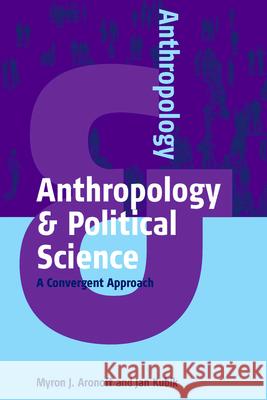Anthropology and Political Science: A Convergent Approach » książka
Anthropology and Political Science: A Convergent Approach
ISBN-13: 9781782386698 / Angielski / Miękka / 2014 / 368 str.
"A person encountering the challenge of integrating anthropology and political science for the first time will find the book engaging and informative. It is a book that could profitably be used as an adjunct text in methods classes or theory classes in both anthropology and political science... It] is a welcome addition to the conversation between these two disciplines." - Political Science Quarterly "Theoretically extremely rich...this book ranges over a wide expanse of topics and themes...the authors present an outstanding critical understanding of five different types of ethnography-traditional/positivistic, interpretivist, postmodern, global (multiple research sites) - and paraethnography...For all of its theoretical complexity, the payoff in navigating this outstanding book is well worth the effort." - Israel Studies Review "What a welcome book Myron J. Aronoff and Jan Kubik, two erudite, widely read, and innovative scholars, have provided an insightful and much-needed map that charts the terrain linking politics and culture. This intervention into a long-standing conversation about the boundaries of the 'political' will stimulate students for years to come." - Ed Schatz, University of Toronto What can anthropology and political science learn from each other? The authors argue that collaboration, particularly in the area of concepts and methodologies, is tremendously beneficial for both disciplines, though they also deal with some troubling aspects of the relationship. Focusing on the influence of anthropology on political science, the book examines the basic assumptions the practitioners of each discipline make about the nature of social and political reality, compares some of the key concepts each field employs, and provides an extensive review of the basic methods of research that "bridge" both disciplines: ethnography and case study. Through ethnography (participant observation), reliance on extended case studies, and the use of "anthropological" concepts and sensibilities, a greater understanding of some of the most challenging issues of the day can be gained. For example, political anthropology challenges the illusion of the "autonomy of the political" assumed by political science to characterize so-called modern societies. Several chapters include a cross-disciplinary analysis of key concepts and issues: political culture, political ritual, the politics of collective identity, democratization in divided societies, conflict resolution, civil society, and the politics of post-Communist transformations. Myron J. Aronoff is Professor Emeritus of Political Science, Anthropology, and Jewish Studies at Rutgers University and Visiting Professor Emeritus of Political Science at the University of Michigan. He is the recipient of the 2013 AIS-Isreael Institute Lifetime Achievement Award. Jan Kubik is Professor of Political Science at Rutgers University and also serves as a Recurring Visiting Professor of Sociology, Center for Social Studies, Polish Academy of Sciences, Warsaw.
"A person encountering the challenge of integrating anthropology and political science for the first time will find the book engaging and informative. It is a book that could profitably be used as an adjunct text in methods classes or theory classes in both anthropology and political science...[It] is a welcome addition to the conversation between these two disciplines." · Political Science Quarterly"Theoretically extremely rich...this book ranges over a wide expanse of topics and themes...the authors present an outstanding critical understanding of five different types of ethnography-traditional/positivistic, interpretivist, postmodern, global (multiple research sites) - and paraethnography...For all of its theoretical complexity, the payoff in navigating this outstanding book is well worth the effort." · Israel Studies Review"What a welcome book! Myron J. Aronoff and Jan Kubik, two erudite, widely read, and innovative scholars, have provided an insightful and much-needed map that charts the terrain linking politics and culture. This intervention into a long-standing conversation about the boundaries of the political will stimulate students for years to come." · Ed Schatz, University of TorontoWhat can anthropology and political science learn from each other? The authors argue that collaboration, particularly in the area of concepts and methodologies, is tremendously beneficial for both disciplines, though they also deal with some troubling aspects of the relationship. Focusing on the influence of anthropology on political science, the book examines the basic assumptions the practitioners of each discipline make about the nature of social and political reality, compares some of the key concepts each field employs, and provides an extensive review of the basic methods of research that "bridge" both disciplines: ethnography and case study. Through ethnography (participant observation), reliance on extended case studies, and the use of "anthropological" concepts and sensibilities, a greater understanding of some of the most challenging issues of the day can be gained. For example, political anthropology challenges the illusion of the "autonomy of the political" assumed by political science to characterize so-called modern societies. Several chapters include a cross-disciplinary analysis of key concepts and issues: political culture, political ritual, the politics of collective identity, democratization in divided societies, conflict resolution, civil society, and the politics of post-Communist transformations.Myron J. Aronoff is Professor Emeritus of Political Science, Anthropology, and Jewish Studies at Rutgers University and Visiting Professor Emeritus of Political Science at the University of Michigan. He is the recipient of the 2013 AIS-Isreael Institute Lifetime Achievement Award.Jan Kubik is Professor of Political Science at Rutgers University and also serves as a Recurring Visiting Professor of Sociology, Center for Social Studies, Polish Academy of Sciences, Warsaw.











